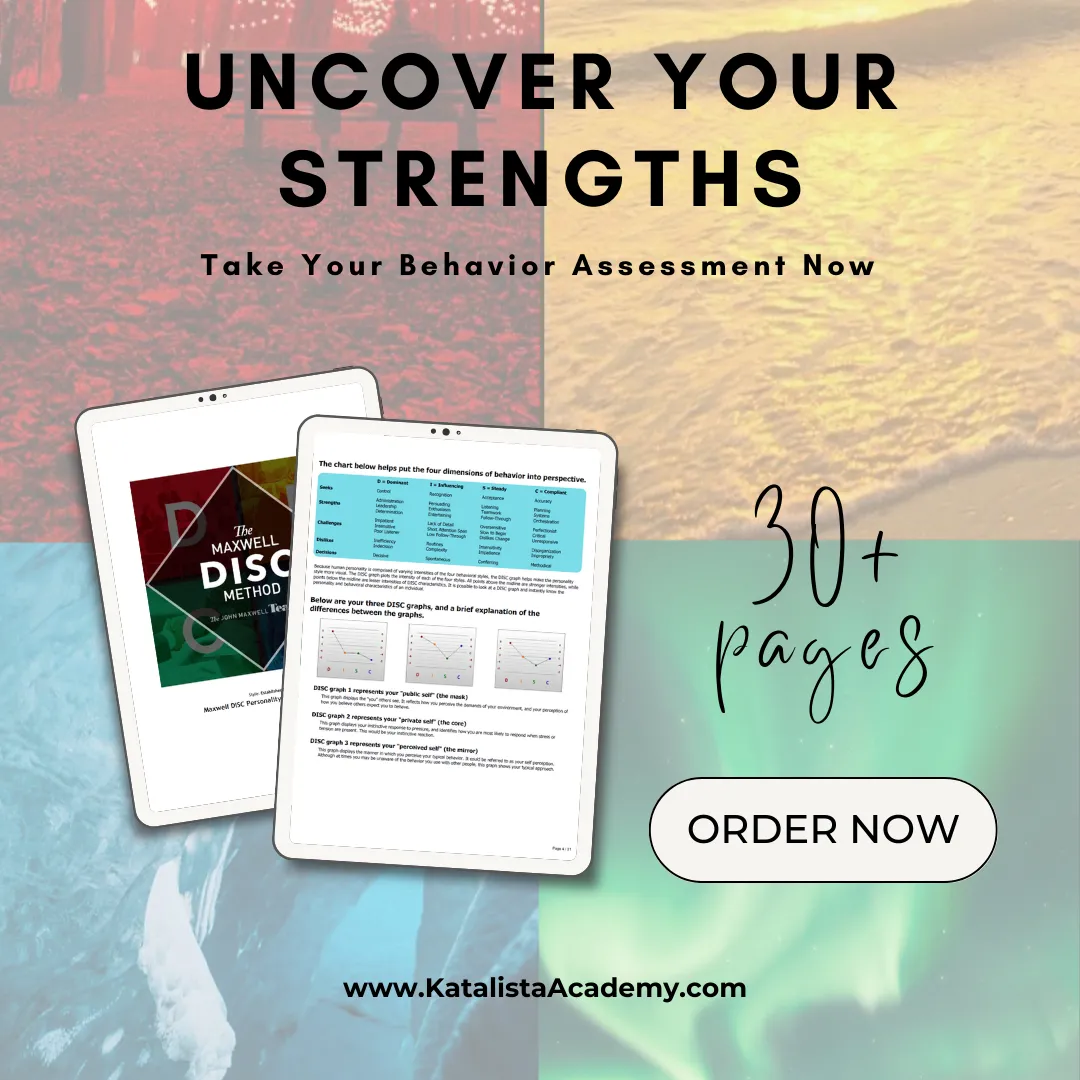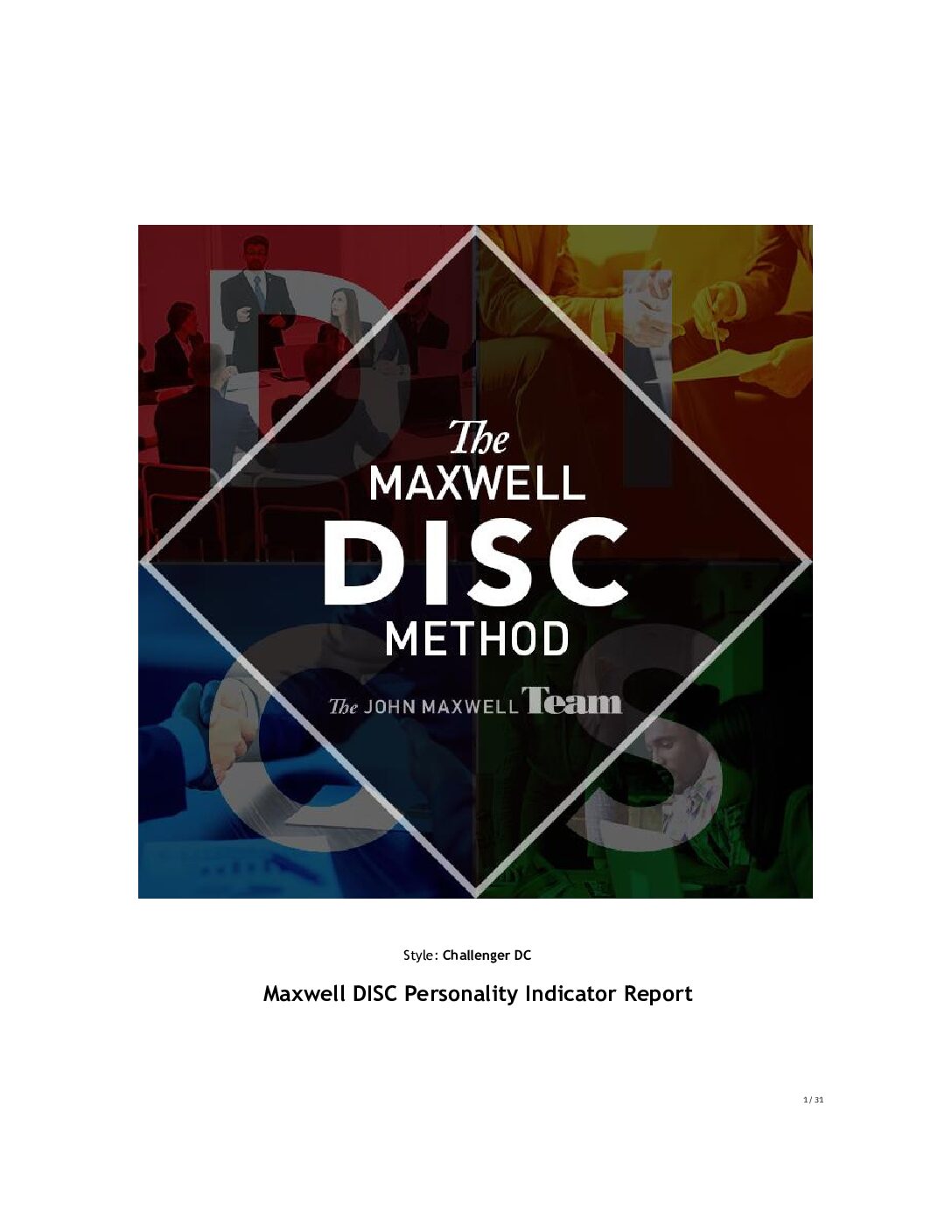
In the fast-paced and highly competitive world of business, understanding and effectively communicating with clients, prospects, and even employees and team members can be the difference between success and failure. While there are numerous tools and strategies available to enhance communication and interpersonal relationships, the DISC method stands out as a remarkably effective and accessible approach.
The Power of the DISC Method
The DISC method, rooted in behavioral psychology, offers profound insights into human behavior, providing a framework to understand and categorize communication styles. The acronym DISC represents four primary personality traits: Dominant/Driver (D), Influential/Inspiring (I), Steady/Supportive (S), and Correct/Compliant (C). These traits encompass a range of behaviors and preferences that shape the way individuals interact with the world around them.
One of the key takeaways from the DISC method is that it encourages individuals to adopt what's known as the Platinum Rule: "Treat others the way they want to be treated." This shift from the traditional Golden Rule ("Treat others how you want to be treated") recognizes that people have diverse communication styles, and effective communication requires adapting to their preferences.
A common challenge in business is the tendency to communicate with others based on our own communication style. For instance, someone with a dominant (D) style may prefer direct and assertive communication, assuming that everyone values the same approach. However, this can lead to misunderstandings, conflicts, and missed opportunities, especially when dealing with clients or prospects who have different communication styles.
Furthermore, some may believe that knowing their DISC profile is the end of the journey. They may wonder, "What can I do with this information?" The truth is, discovering your DISC style is just the beginning. The real transformation happens when you leverage this awareness to adapt your communication, build stronger relationships, and drive business success.
Personal Insights:
A Transformative Journey
I can personally attest to the power of the DISC method. Early in my career as a financial professional, I faced challenges in gaining clients' trust and engagement. Meeting with high-powered prospects, I often felt that my youth (at that time) worked against me. However, once I discovered my own DISC profile and began implementing DISC principles, I witnessed a remarkable transformation in my financial career.
By understanding and adapting to the communication styles of my clients, I not only gained their trust but also established deeper, longer-lasting relationships. The DISC method allowed me to tailor my approach to match their preferences, ensuring that I was speaking their "language." This shift was the turning point that changed the trajectory of my career and significantly impacted my personal life.

Curious What a DISC Report Will Uncover About You?
Our DISC report offers valuable insights into your communication style, strengths, and areas for growth. As you explore the transformative power of the DISC method in this blog post, take the next step towards personal and professional development by ordering your personalized DISC report. Enhance your business, strengthen relationships, and foster effective communication today.
Industry Insights Using The DISC Method
Understanding which industries lean towards different DISC styles can provide valuable insights for professionals seeking success in specific sectors. Each DISC style - Dominant / Driver (D), Influencing / Inspiring (I), Steady / Supportive (S), and Correct / Compliant (C) - offers unique attributes that are well-suited to various professional settings.
In industries such as finance and corporate management, where assertiveness and confidence are paramount, the Dominant (D) style is often prevalent. Professionals in finance rely on decisive decision-making, which aligns perfectly with the dominant approach to tasks and challenges. The corporate world benefits greatly from individuals who can take charge and drive results.
The Influential (I) style excels in roles that require relationship-building and persuasion, making it ideal for sales and marketing professionals. Their outgoing nature and charm are valuable assets in winning over clients and customers. In these fields, the ability to connect with people on a personal level can be a game-changer, and the Influential style naturally shines in this regard.
In sectors like healthcare and customer service, the Steady (S) approach is highly valued. Patients and customers appreciate the patience, empathy, and reliability exhibited by those with an S style. In these industries, creating a supportive and comforting environment is crucial, and Steadiness plays a key role in achieving this.
In industries like technology and engineering, where precision and attention to detail are paramount, the Conscientious (C) style shines. These individuals are meticulous and thorough, ensuring the quality of their work. In technical fields, accuracy and reliability are non-negotiable, and the Conscientious style aligns perfectly with these requirements.
Unlocking Business HR Success with DISC
Incorporating the DISC Method into your business and HR practices is more than just a strategy; it's a game-changer. From refining your hiring process to enhancing team dynamics, reducing turnover, and resolving conflicts effectively, discover how DISC can transform your business for the better.
A Valuable Hiring Tool
Understanding the DISC profiles of existing team members and potential hires can help create harmonious, well-balanced teams. For instance, introducing an Influential (I) communicator into a team of Dominant (D) personalities can enhance collaboration and creative thinking. Diverse teams that leverage the strengths of each DISC style often outperform homogenous groups.
Team Dynamics
Understanding the DISC profiles of existing team members and potential hires can help create harmonious, well-balanced teams. For instance, introducing an Influential (I) communicator into a team of Dominant (D) personalities can enhance collaboration and creative thinking. Diverse teams that leverage the strengths of each DISC style often outperform homogenous groups.
Reducing Turnover
Hiring individuals whose DISC profiles align with the demands of the job can significantly reduce turnover rates. For instance, placing a Conscientious (C) individual in a highly detail-oriented role is more likely to result in job satisfaction and long-term commitment. Lower turnover rates translate to reduced recruitment and training costs, providing a tangible return on investment.
Conflict Resolution
The DISC method equips HR professionals and managers with tools by identifying the root causes of conflicts based on DISC styles, interventions can be tailored to resolve disputes efficiently. Instead of using a one-size-fits-all approach to conflict resolution, organizations can address the specific needs and preferences of the individuals involved, leading to more effective and lasting solutions.
Trusted in Coaching
The DISC method has earned a well-deserved place of trust in coaching, where it serves as a foundational tool for personal and professional development. Coaches use DISC assessments to guide clients on a transformative journey toward greater self-awareness, improved communication, and enhanced relationships.
Unlocking Personal Potential
In a coaching context, DISC assessments provide individuals with invaluable insights into their communication styles, strengths, and areas for growth. Clients gain a deep understanding of how they interact with others, enabling them to navigate personal and professional relationships more effectively. This newfound self-awareness often leads to improved confidence, leadership skills, and overall personal growth.

Fostering Better Relationships
Coaches use DISC principles to help clients navigate challenging relationships, whether in the workplace or personal life. By identifying the DISC styles of others, clients can tailor their communication approaches to connect more authentically and harmoniously. Improved relationships often lead to reduced stress, enhanced job satisfaction, and better work-life balance.
Enhancing Leadership
Leadership coaching frequently incorporates the DISC method to empower individuals to become more effective leaders. Through DISC assessments, leaders gain insights into their leadership styles and learn how to adapt their approaches to meet the needs of diverse teams. This flexibility in leadership fosters better teamwork, employee engagement, and organizational success.
Beyond Business
While the DISC method finds extensive use in business and professional settings, its applications extend beyond the corporate world. It is a valuable tool for improving personal relationships, enhancing leadership skills, and fostering more productive collaborations in all aspects of life.

Personal Growth
While the DISC method finds extensive use in business and professional settings, its applications extend beyond the corporate world. It is a valuable tool for improving personal relationships, enhancing leadership skills, and fostering more productive collaborations in all aspects of life.
Strengthening Personal Relationships
DISC assessments are effective tools for improving personal relationships, whether in families, friendships, or romantic partnerships. By understanding each other's communication styles, individuals can navigate conflicts more constructively and deepen their connections. The DISC method provides a framework for resolving differences and fostering mutual understanding.
Stay in the Loop! Join Our Exclusive DISC Newsletter
Unlock Fresh Insights, Tips, and Updates Delivered Right to Your Inbox.


